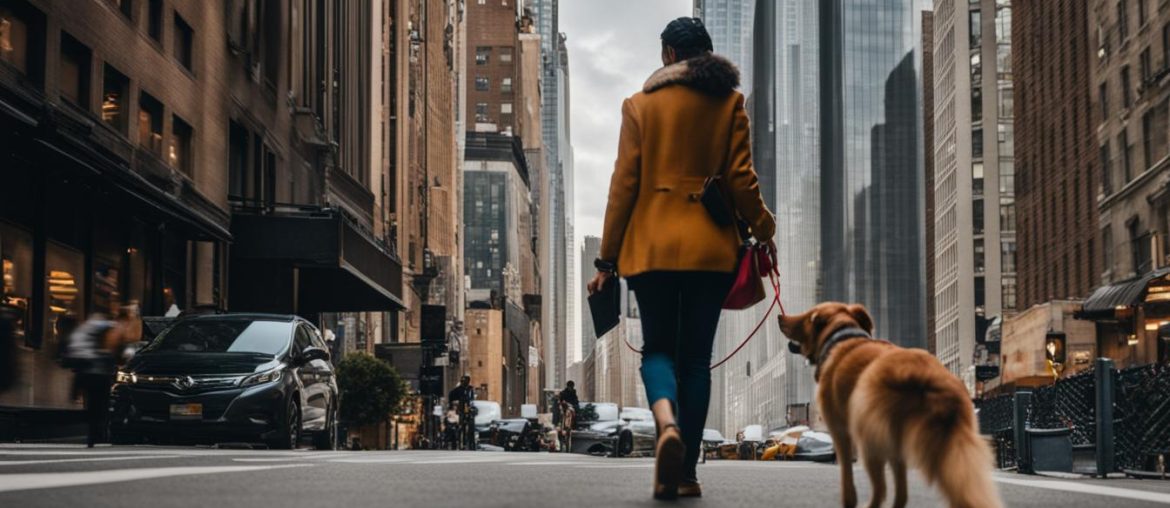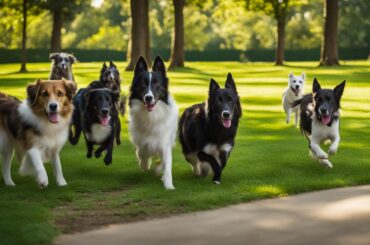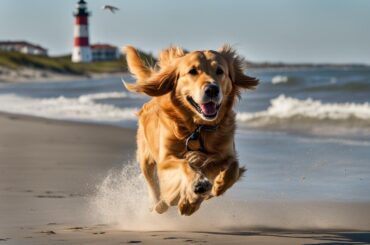Welcome to my comprehensive guide on understanding NYC dog laws. If you are a dog owner in New York City, it is essential to be familiar with the specific regulations that govern pet ownership in this bustling metropolis. By understanding and adhering to these laws, you can ensure the safety and well-being of your furry friend while also avoiding any legal issues.
New York City has established a set of dog laws that cover various aspects of dog ownership. From licensing requirements to leash laws, pooper scooper rules, and even regulations concerning dangerous dogs, it is good practice to stay informed about these regulations to be a responsible dog owner. Let’s delve into the different areas of NYC dog laws and explore what each entails.
Key Takeaways:
- NYC dog laws are specific regulations dedicated to dogs living in New York City.
- All dogs in NYC must have a valid dog license displayed on their collar or harness.
- Dogs must be on a leash no longer than six feet in public, except during designated off-leash hours.
- Owners are required to clean up after their dogs to comply with the pooper scooper law.
- Dogs must be vaccinated against rabies, and tying or chaining a dog for more than three hours is illegal.
- Additional laws cover dangerous dogs and dog cruelty.
NYC Dog Licensing Requirements
As a responsible dog owner in New York City, you should understand the licensing requirements for your furry companion. All dogs living in the city are required to have a NYC dog license. This license not only helps with identification but also ensures that your dog is up to date with vaccinations and allows for easier medical follow-ups.
Renewing your dog’s license is essential to comply with the law. The renewal period varies depending on your dog’s age and spaying/neutering status. Puppies under four months old are exempt from needing a license, as well as dogs who have resided in the city for less than 30 days and those housed in institutions with a certificate of exemption.
Dog License Renewal Period
Here is an overview of the renewal periods based on your dog’s age and spaying/neutering status:
| Dog’s Age | Spayed/Neutered | License Renewal Period |
|---|---|---|
| Under 1 year | Yes | 1 year |
| Under 1 year | No | 1 year |
| 1 year or older | Yes | 1 to 5 years |
| 1 year or older | No | 1 year |
By adhering to the NYC dog licensing requirements, you not only ensure that your dog is legally registered but also contribute to the overall safety and well-being of the community. Be sure to renew your dog’s license within the specified timeframe to avoid any penalties or fines.
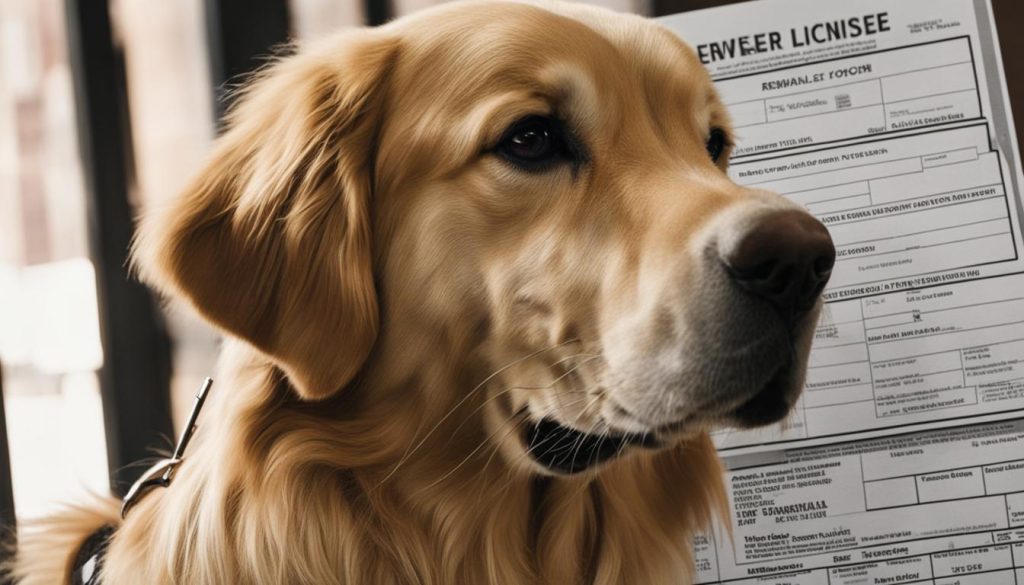
“Having a NYC dog license is not only a legal requirement, but it also provides peace of mind, knowing that your dog is protected and identifiable. It also helps support local animal shelters and aids in finding lost dogs. Make sure to keep your dog’s license visible on their collar or harness at all times when in public.”
Leash Laws for Dogs in NYC
When it comes to dog ownership in New York City, understanding the leash laws is crucial. In order to ensure the safety and well-being of both dogs and the community, all dogs must be on a leash no longer than six feet when in public places or open fields. This helps to prevent any potential incidents or accidents and allows for better control over the dog’s actions.
However, there are designated off-leash hours at certain parks and dog runs in NYC where dogs can run freely. During these specified times, dogs are allowed to be off-leash and enjoy their time outdoors. This provides an opportunity for them to socialize and exercise in a safe and controlled environment.
It’s crucial for dog owners to familiarize themselves with the specific off-leash hours in their local area and to abide by the leash laws outside of these designated times. Failing to comply with leash laws can result in fines ranging from $200 to $400, so I would advise that you be aware of and follow these regulations to avoid any penalties.
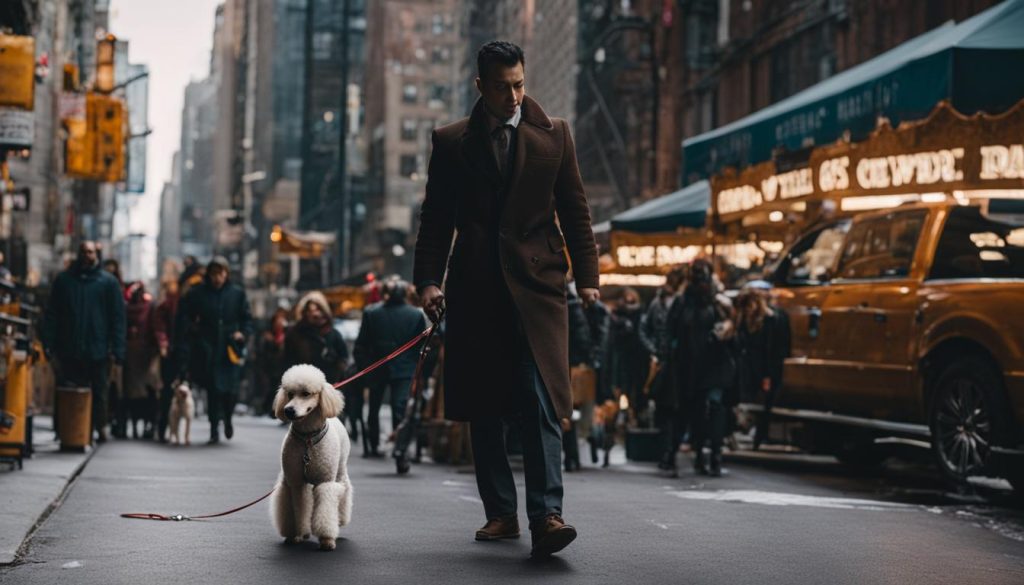
The Importance of Leash Laws
Leash laws in NYC serve several important purposes. Firstly, they help to ensure public safety by preventing dogs from running loose and potentially causing harm to other people, animals, or property. By keeping dogs on a leash, owners can better control their behavior and prevent any aggressive or unpredictable actions.
Secondly, leash laws promote responsible pet ownership. They encourage dog owners to actively participate in the care and supervision of their dogs, ensuring that they are always within reach and not causing any disturbances. This includes cleaning up after their dogs and being aware of their surroundings.
Ultimately, leash laws play a vital role in maintaining a harmonious coexistence between dog owners and the general public in New York City. By adhering to these regulations, dog owners can help create a safe and pleasant environment for everyone to enjoy.
NYC Dog Pooper Scooper Law
In New York City, dog owners are required to adhere to the NYC Pooper Scooper Law. This law, also known as the Canine Waste Law, mandates that dog owners clean up after their dogs and properly dispose of any feces left in public areas such as sidewalks, streets, and parks. The purpose of this law is to maintain cleanliness, hygiene, and the overall well-being of the city.
Failure to comply with the NYC Pooper Scooper Law can result in fines of up to $250. I recommend for dog owners to carry waste bags or scoopers when walking their dogs and to promptly clean up after them. By doing so, dog owners contribute to a cleaner environment and help prevent the spread of diseases that can be transmitted through dog waste.
“The NYC Pooper Scooper Law ensures that dog owners take responsibility for their pets and actively participate in keeping our streets clean and safe for everyone.”
By properly disposing of dog waste, dog owners also demonstrate respect for their fellow residents and promote a sense of community pride. Additionally, you should note that the NYC Pooper Scooper Law applies to both residents and visitors, emphasizing the city’s commitment to cleanliness and the health of its inhabitants.
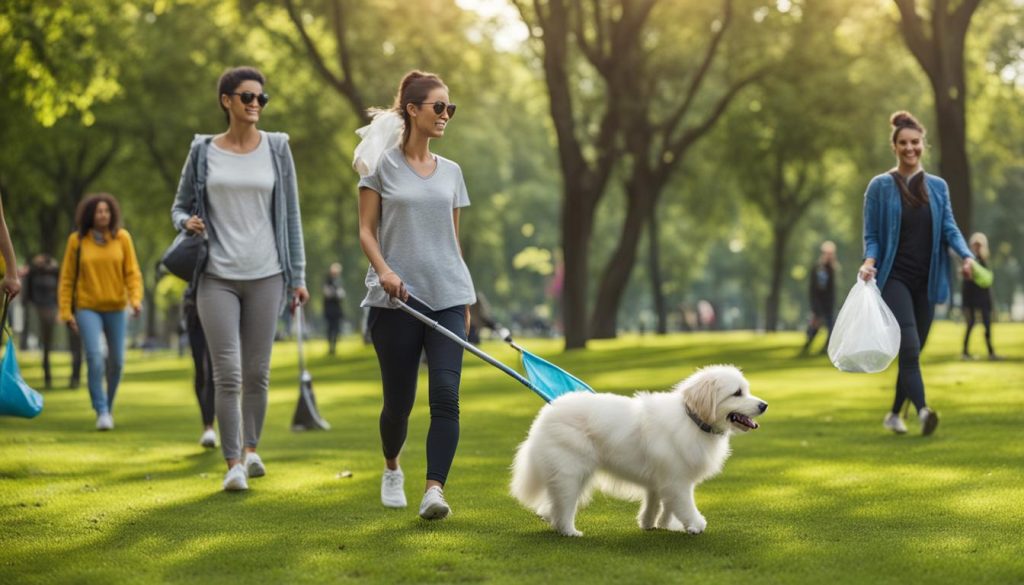
| Benefits of the NYC Pooper Scooper Law | Dog waste disposal methods |
|---|---|
| 1. Clean and hygienic public spaces | 1. Using biodegradable waste bags |
| 2. Preventing the spread of diseases | 2. Utilizing scoopers or rakes |
| 3. Maintaining a pleasant environment | 3. Seeking out designated dog waste bins |
| 4. Showing respect for others | 4. Disposing of waste in the owner’s trash container |
By understanding and adhering to the NYC Pooper Scooper Law, dog owners contribute to the overall cleanliness and well-being of New York City. Cleaning up after dogs not only benefits the community but also fosters responsible dog ownership and sets a positive example for others.
Dog Nuisance Laws in NYC
As responsible dog owners, you should be aware of and adhere to dog nuisance laws in New York City. These laws are in place to ensure that dogs do not become a nuisance to others in public places. It is our responsibility to prevent our dogs from engaging in behaviors that may disturb or inconvenience others.
Dog nuisance laws encompass a variety of behaviors, such as urinating or defecating on sidewalks, floors, walls, or any public or private premises. You might want to properly train and socialize our dogs to prevent such occurrences. By providing our dogs with the necessary training and guidance, we can minimize the likelihood of them engaging in behaviors that may be considered a nuisance.
Failure to control our dogs and prevent them from being a nuisance can result in fines ranging from $200 to $400. These fines serve as a reminder of our responsibility to be considerate of others and to ensure that our dogs are well-behaved in public spaces. By being vigilant and proactive in our dog ownership, we can contribute to a harmonious and respectful community environment.
| Behavior | Fine |
|---|---|
| Urinating or defecating in public | $200 – $400 |
| Excessive barking or howling | $200 – $400 |
| Uncontrolled aggressive behavior | $200 – $400 |
By promoting responsible dog ownership and preventing dog nuisances, we can create a more enjoyable and inclusive environment for all members of the community. I would recommend to be mindful of our dogs’ behaviors and to take appropriate measures to address any potential issues. Together, we can ensure that the bond between humans and dogs remains positive and mutually beneficial.
NYC Dog Vaccination Requirements
New York State law mandates that all dogs must be vaccinated against rabies. It is crucial for dog owners to ensure that their pets receive their initial rabies vaccination by the time they are four months old. Carrying proof of vaccination is also a requirement when taking your dog outside. A rabies tag must be attached to the dog’s collar or harness, indicating that the dog has been vaccinated. This not only helps protect the health of dogs but also prevents the spread of rabies to humans. You should note that failure to comply with vaccination requirements can result in penalties and fines.
Adhering to dog vaccination laws is a responsible practice for dog owners. By vaccinating our dogs against rabies, we are not only complying with the law but also safeguarding the well-being of our pets and the community. Rabies is a serious disease that can be fatal to both animals and humans. Vaccination provides dogs with the necessary immunity to protect them from this potentially deadly virus. Carrying proof of vaccination and attaching a rabies tag to your dog’s collar or harness not only ensures compliance with the law but also serves as a visible indication that your dog is protected against rabies.
Vaccination requirements for dogs are an essential aspect of responsible pet ownership. Vaccines not only protect individual dogs but also contribute to the overall health and safety of the dog population. By vaccinating our dogs, we reduce the risk of rabies transmission, which is not only dangerous for dogs but also poses a significant public health concern. Carrying proof of vaccination when out with your dog is vital for demonstrating compliance with the law and helping to prevent the spread of this deadly disease.
| Vaccination Requirements | Benefits |
|---|---|
| Initial rabies vaccination by 4 months | Protects dogs from rabies and prevents the spread of the disease |
| Carrying proof of vaccination | Demonstrates compliance with the law and safeguards the health of dogs and humans |
| Attaching a rabies tag to the dog’s collar or harness | Visible indication that the dog is vaccinated against rabies |
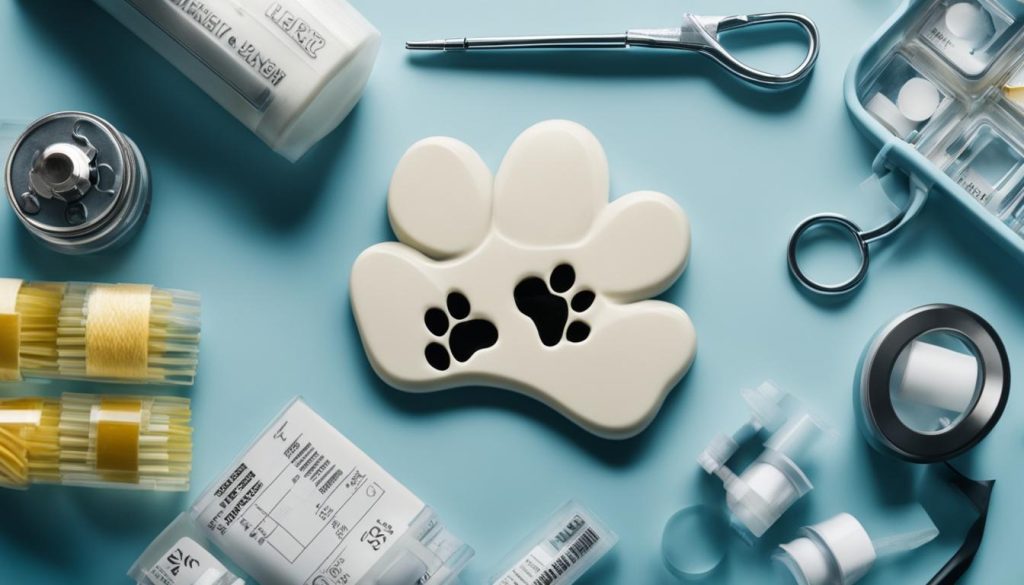
Complying with NYC dog vaccination requirements is essential for responsible dog ownership. Protecting our dogs from diseases such as rabies not only ensures their well-being but also helps maintain a healthy and safe environment for all. Vaccination not only provides individual protection but also contributes to the greater goal of preventing the spread of deadly diseases. By staying up to date with vaccinations, carrying proof of vaccination, and attaching a rabies tag, we demonstrate our commitment to our four-legged companions and the community at large.
Outdoor Dog Laws in NYC
In New York State, pending legislation aims to further protect the welfare of outdoor dogs by restricting the amount of time they can be tied or chained. The proposed law states that it would be illegal to tie or chain a dog for more than three hours. This legislation aims to ensure that dogs are not subjected to prolonged confinement and can enjoy a safe and comfortable living environment.
For outdoor dogs that are not subject to the time restriction, the legislation also requires that they be confined in a cage or pen that is at least four times the height and length of the dog. This requirement ensures that outdoor dogs have adequate space to move around and engage in natural behaviors.
By implementing these outdoor dog laws, New York State aims to improve the welfare of dogs and prevent them from experiencing unnecessary physical and psychological harm. I highly recommend dog owners to provide proper living conditions and avoid leaving their dogs outdoors for extended periods. Responsible dog ownership includes not only providing food, water, and shelter but also ensuring that dogs have the opportunity to exercise, socialize, and live a fulfilling life.
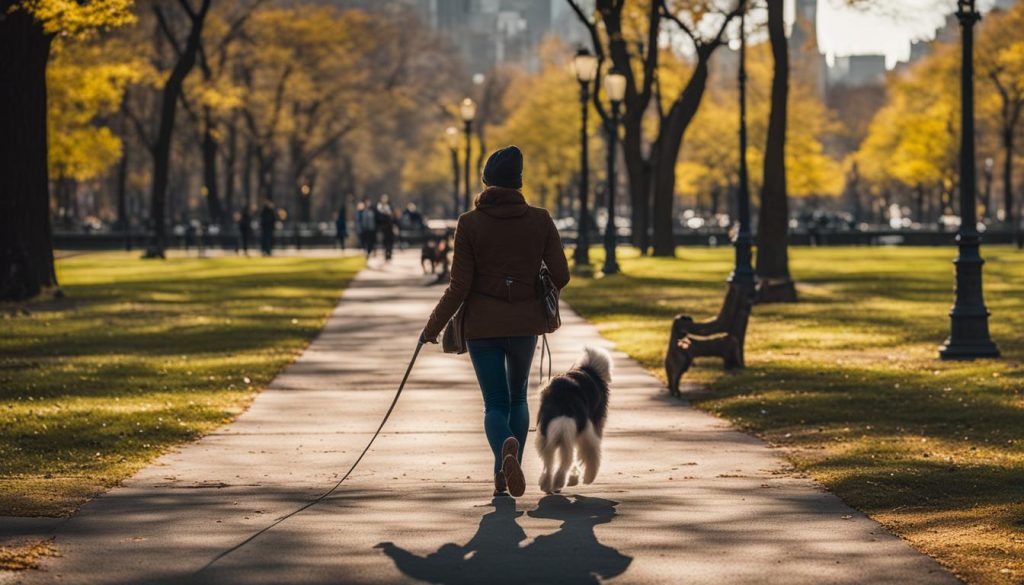
Key Points
- Proposed legislation in New York State aims to limit the time dogs can be tied or chained outdoors to three hours.
- Dogs that are kept outdoors for a shorter duration must be confined in a cage or pen that is at least four times the height and length of the dog.
- These laws aim to improve the welfare of outdoor dogs and prevent them from being subjected to prolonged confinement.
- Responsible dog ownership includes providing proper living conditions and avoiding leaving dogs outdoors for extended periods.
| Outdoor Dog Laws in NYC | Implications |
|---|---|
| Restriction on tying or chaining dogs for more than three hours | Protects dogs from prolonged confinement and ensures their well-being |
| Requirement for outdoor dogs to be confined in a cage or pen that is at least four times their height and length | Provides outdoor dogs with adequate space to move around and engage in natural behaviors |
“Responsible dog ownership extends to providing proper living conditions for outdoor dogs and recognizing their need for physical and mental stimulation.”
NYC Dangerous Dog Laws
When it comes to dog ownership in New York City, understanding the laws surrounding dangerous dogs is of utmost importance. The city has strict regulations in place to protect both residents and animals from potential harm. Under New York State law, a dangerous dog is defined as one that attacks a person or another animal without justification, poses a serious threat to public safety, or attacks a service dog.
Owners of dangerous dogs can face serious consequences. They may be subject to fines, misdemeanor charges, and potential liability for medical expenses resulting from an attack. In some cases, dangerous dogs may be required to be muzzled or even euthanized. It is crucial for dog owners to take responsibility for their pets’ behavior and prevent them from becoming dangerous.
“Owning a dangerous dog comes with great responsibility. I would recommend to properly train and socialize your dog to prevent aggression or harm to others.”
By following the laws and regulations surrounding dangerous dogs, dog owners can help ensure the safety of both their pets and the community. It is recommended to seek professional assistance if there are any behavioral concerns or signs of aggression in a dog. Taking proactive measures will not only protect others but also provide a better quality of life for both the owner and the dog.
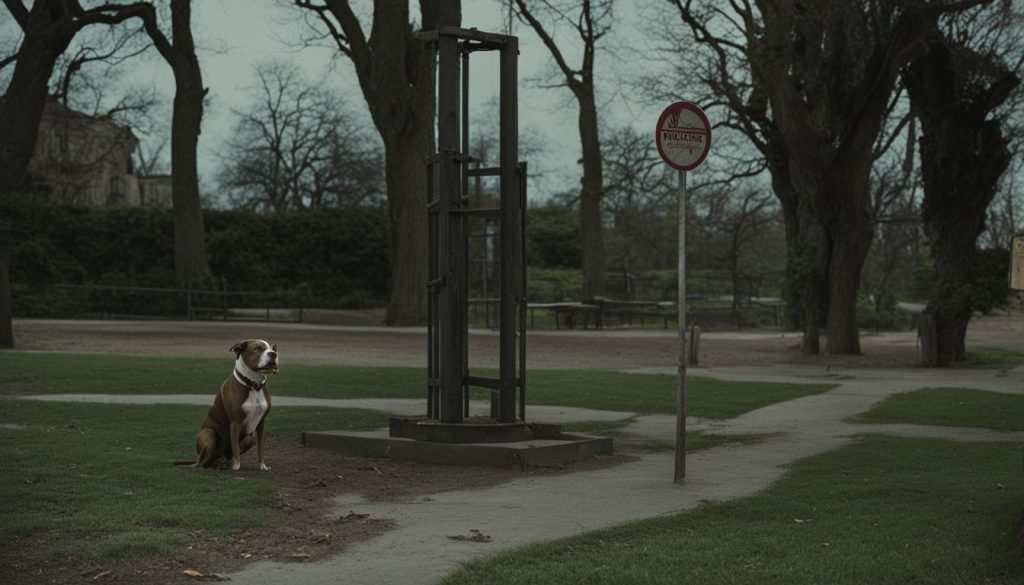
Dangerous Dog Laws in New York City
| Consequences for Owning a Dangerous Dog | Details |
|---|---|
| Fines | Owning a dangerous dog can result in fines ranging from $500 to $10,000, depending on the severity of the incident. |
| Misdemeanor Charges | In addition to fines, owners may face misdemeanor charges, which can lead to imprisonment for up to one year. |
| Liability for Medical Expenses | If a dangerous dog causes injuries to another person or animal, the owner may be held liable for medical expenses resulting from the incident. |
| Muzzling Requirements | In some cases, owners may be required to muzzle their dangerous dogs when in public to prevent further harm. |
| Euthanasia | If a dangerous dog poses an ongoing threat to public safety, it may be euthanized to prevent future incidents. |
Final Thoughts
To sum it up, responsible dog ownership in New York City entails understanding and following the various dog laws in place. By complying with these regulations, dog owners can ensure the safety and well-being of their pets as well as the community.
One of the key aspects of responsible dog ownership is obtaining a NYC dog license. This not only helps with identifying and locating lost dogs but also supports animal shelters and simplifies medical follow-ups.
In addition, adhering to leash laws and cleaning up after dogs are crucial for maintaining cleanliness and preventing the spread of disease in public areas. Vaccinating dogs against rabies is a legal requirement that helps protect both dogs and humans from this deadly disease.
Furthermore, providing proper outdoor living conditions and preventing dogs from becoming dangerous are important aspects of responsible dog ownership. I would recommend to stay informed about any updates or changes to dog laws and always comply with the regulations in place. By doing so, dog owners can ensure a harmonious coexistence between their pets and the community.
FAQ
Do all dogs living in New York City need a dog license?
Yes, all dogs living in New York City must have a NYC dog license. The license must be visible on their collar or harness at all times in public.
How often do I need to renew my dog’s license?
The renewal period for a NYC dog license depends on the dog’s age and spaying/neutering status. It can range from one to five years.
Are there any exemptions to the dog license requirement?
Yes, dogs under four months old, dogs residing in the city for less than 30 days, and dogs housed in institutions with a certificate of exemption are exempt from needing a license.
Are there leash laws for dogs in New York City?
Yes, all dogs must be on a leash no longer than six feet when in public places or open fields. However, there are designated off-leash hours at certain parks and dog runs.
What is the pooper scooper law in NYC?
The pooper scooper law, also known as the Canine Waste Law, requires dog owners to clean up after their dogs. Failing to do so can result in a fine of $250.
Can dogs commit a nuisance in public places?
No, dogs should not commit a nuisance, such as urinating or defecating, on sidewalks, floors, walls, or any public or private premises.
Are dogs required to be vaccinated against rabies in NYC?
Yes, according to New York State law, all dogs must be vaccinated against rabies. The initial vaccination should be done by the time the dog is four months old.
Can I tie or chain my dog for long periods of time?
No, New York State has pending legislation that would make it illegal to tie or chain a dog for longer than three hours. Proper outdoor living conditions must be provided.
What are the laws regarding dangerous dogs in NYC?
New York State has laws regarding dangerous dogs. If a dog is deemed dangerous, the owner may face fines, charges, and potential liability for medical expenses. Dangerous dogs may need to be muzzled or euthanized.


